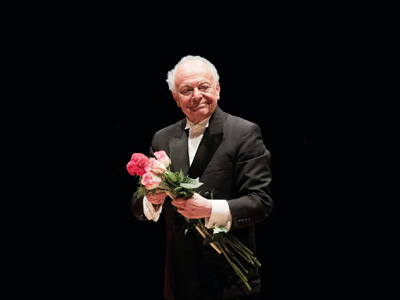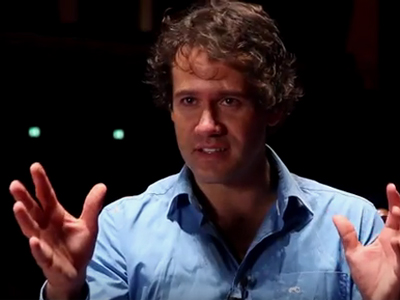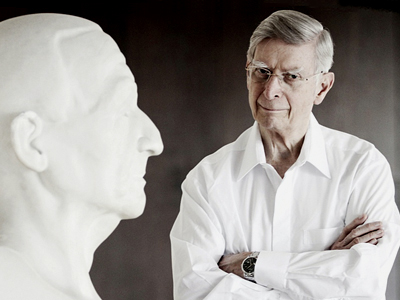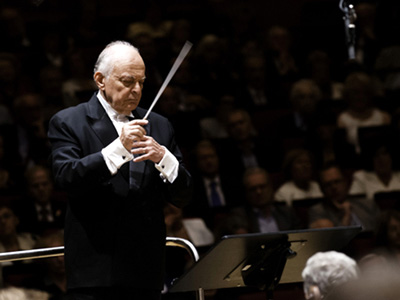
By ANDREW POWELL
Published: October 11, 2012
MUNICH — Arts groups here present a restrained 2012–13 season facing pros and cons not always aligned with those in America. Funding, for instance, holds steady: city and state (Bavaria) play their part, as do local corporations Siemens, BMW, Audi, Allianz and Linde. Excellent pools of musicians, instrumental and vocal, fill the rosters of the choir, chamber orchestra, two opera companies, and five symphony orchestras discussed below. Audiences are large and regular; not incidentally, tickets for most events are affordably priced and come with free access to the train and bus network, covering residents in a 25-mile radius. The cons are few, but they matter. Creative torpor impedes the main orchestras, a reflection in part of more than one sadly filled music directorship. The Regietheater problem rages in Germany, defiling the worthiest efforts in opera. Atrocious acoustics plague Munich’s main concert hall, and one vintage venue is shut for now for a retrofit. All that said, the groups enter the new season with active agendas.
The 201-year-old Bavarian State Orchestra ventures six programs at its home, the National Theater. Mostly led by outgoing Generalmusikdirektor Kent Nagano, these Akademie concerts extend a tradition begun when the ensemble was new; their past features names like Strauss, Walter, Knappertsbusch, Krauss, Fricsay, Sawallisch and Kleiber. Under-rehearsal can hamper results, however, a consequence of the musicians’ hectic theater schedule; that the GMD does not always supply the last ounce of insight or much rhythmic thrust only accentuates the negative. Despite and still, one upcoming program has allure (April 8 and 9): the eloquent young Czech conductor Tomáš Hanus tackles Mahler’s kaleidoscopic Seventh Symphony.
Clarinetist Jörg Widmann’s seven-scene opera Babylon is a fall commission of Bavarian State Opera, Germany’s largest and busiest opera company. Nagano conducts as part of his last season, and Carlus Padrissa, who last year introduced a circus-tent Turandot, has been entrusted with the stage action (premiere Oct. 27). Several of the season’s productions will be streamed at no charge, starting with the Widmann on Nov. 3. Hanus follows his persuasive (and filmed) Rusalka of two years ago with a revival of Jenůfa (from March 6) as well as a Richard Jones production of Hänsel und Gretel (March 24). Constantinos Carydis, among the company’s other worthy conductors — and indeed winner of its first Carlos Kleiber Prize — is absent from the 2012–13 slate, effecting a sabbatical.
The smaller but versatile Staatstheater am Gärtnerplatz company enters a second season as refugee while its genial home undergoes construction work. Not all the substitute venues are ideal, but at the Cuvilliés Theater a Don Pasquale (premiere Oct. 25) should bring smiles: Franz Hawlata sings the title role, retired mezzo-soprano Brigitte Fassbaender (pictured with Intendant Josef Köpplinger and conductor Marco Comin) serves as régisseuse. This company labors under a mixed mandate, complementing Bavarian State Opera with Baroque and rare operas but also catering to a broad audience with operettas and musicals, at times amplified. Its orchestra copes gamely with the assortment, its singers less well.
Alexander Liebreich’s ongoing leadership of the MKO, a.k.a. Münchener Kammerorchester, has been yielding tidy ensemble and a crisp image for the group. Subscription concerts at MKO’s base, the Bayreuth-Festspielhaus-like Prinz-Regenten-Theater, habitually pair old and brand new, as on Oct. 18: Salvatore Sciarrino’s L’ideale lucente e le pagine rubate (2012) and Beethoven’s music for Egmont. Or Dec. 13: Ligeti’s Violin Concerto (old) and a Helena Winkelman piece jointly commissioned with Musica femina München.
Guest conductors, in contrast, are what enliven the Bavarian Radio Symphony Orchestra. Ranked highly for its expertise, and drilled weekly for clean-as-a-whistle broadcasts, the BRSO perseveres under monochrome directorship. Antonini, Rattle, Haitink, Muti, Harding, Gilbert, Robertson, Salonen, Chailly and Metzmacher are names implying color in upcoming programs. The season splits as usual between the modest shoebox Herkulessaal, part of Munich’s Residenz arts complex, and the city-operated, fan-cum-vineyard Gasteig hall, where only the intra-ensemble sound travels properly.
The adventurous Münchner Rundfunk-Orchester, a second BR (Bavarian Broadcasting) ensemble, devotes much of 2012–13 to oddball concert opera — Franz Lachner’s Catharina Cornaro? — when its exploratory funds would go further in orchestral music and better balance the BRSO. Welcome projects include a German-language take (May 3) on Hindemith’s FDR oratorio When Lilacs Last In the Dooryard Bloom’d, which may find its way to disc alongside this orchestra’s award-winning 2005 recording of Des Simplicius Simplicissimus Jugend by Hartmann (who wove the Whitman elegy into his own First Symphony). Playing standards have been high under Künstlerischer Leiter Ulf Schirmer. He stepped into the shoes of the late Marcello Viotti in 2006 and has more recently also assumed musical and managerial duties at Oper Leipzig.
Still under broadcasting auspices, the BR Chor supports both of the above orchestras. Alert, flexible singing places this group among Germany’s best large choirs, with perhaps only Leipzig’s MDR Chor ahead in precision. Certainly it draws the better Munich choristers, those disinclined to strip down to their underwear and strike mindless poses, as repeatedly required of their colleagues in local opera companies. Dutchman Peter Dijkstra is the affable artistic leader. BR Chor concerts this season, in the group’s own series, include Mozart’s C-Minor Mass (Nov. 24) and a well-cast Matthäus-Passion (Feb. 16), at the Prinz-Regenten-Theater and Herkulessaal respectively.
The Munich Philharmonic seemed to want to dive off a cliff three years ago when its management publicly bickered with its greatly-in-demand Generalmusikdirektor Christian Thielemann, effectively losing him, and just eight months later chose Lorin Maazel as his successor. (One tabloid reported Thielemann’s salary to be €800,000.) Those twin decisions are now home to roost, as the 82-year-old American unfurls his inaugural season. Maazel’s work ethic can only be admired, but he appeared artistically drained in interregnum Gasteig programs ten months ago — in music in which he long ago excelled, such as Debussy’s La Mer. This orchestra will gain the most if Munich ever does build a proper concert hall, as recently championed by Bavarian Minister for Science, Research and Art, Wolfgang Heubisch. As a city-run ensemble, it is today confined almost entirely to the problematic Gasteig.
Less glamorous, though certainly busy, the Münchner Symphoniker offers concert series at the acoustically preferable Prinz-Regenten-Theater and Herkulessaal. Georg Schmöhe is Chefdirigent and pianist Philippe Entremont serves as Ehrendirigent. In 2011 this orchestra undertook a long U.S. tour devoted to movie music. This season at home it offers an all-Beethoven program (Jan. 27 and 28) and a mostly Haydn evening (March 20) as part of a generally conservative lineup.
Photo © Christian Zach
Related posts:
Pintscher Conducts New Music
Mastersingers’ Depression
Gärtnerplatztheater Reopens
Gergiev, Munich’s Mistake
BR Chor’s St Matthew Passion







Gergiev, Munich’s Mistake
Wednesday, April 9th, 2014By ANDREW POWELL
Published: April 9, 2014
MUNICH — Not a week goes by here now without media mention of Valery Gergiev. The musical friend of Vladimir Putin and, more to the point, high-profile employee-to-be of the City of Munich inspires comment even in modest suburban newspapers. Many want his alarmingly long contract (2015–20) shredded.
But the Russian maestro was already a rotten choice as Chefdirigent of the tax-payer-funded, city-run Munich Philharmonic before Putin upset Pink List politicians over human rights and the Green Party over Crimea.
His repertory limitations, his work habits and his first loyalties all portend a discordant, creatively stunted tenure during which Munich, despite its €800,000-a-year* wage, has no hope of being the artist’s top priority. If not shredded, the contract of Feb. 2013 should certainly be adjusted.
Gergiev is globally known from his base at St Petersburg’s Mariinsky Theater, where he operates a network of répétiteurs and conducting assistants who extend brand “Gergiev” beyond the physical and temporal limits of one person.
Seven days ago, for instance, he entered a principal guest conductor agreement (pictured) with Astana Opera, the expensively housed company of Nursultan Nazarbayev in the flat and flashy Kazakh capital.
Munich’s old and Astana’s new money follows Gergiev earnings at the London Symphony Orchestra, where his stint as principal conductor (2007–15) resembles good preparation for the job here.
But London’s one-night, one-program pattern suits the Russian’s lickety-split scheduling better than Munich’s (American-style) weekly program iterations. Example: he is this week able to dart to New York for a Strauss concert between two different LSO Scriabin programs three days apart.
As one MPhil insider earnestly phrased it last December, peripatetic Gergiev “must reinvent himself” so that he can stay in one place, with one program and one group of musicians, for a whole workweek, build partnerships through rehearsals he himself leads, and mine the interpretive depths.
Good luck with that. And the reinventing would need to extend to repertory: Munich concertgoers enjoy their Slavic diversions but expect passionate leadership in Beethoven, Brahms and Bruckner. Alas, in 25 years as a star, Gergiev has acquired no reputation in these composers. Ditto for Haydn, Mozart, Schubert, Schumann and Mendelssohn.
“It’s political,” everyone says, when asked why Gergiev was chosen. They mean he was chosen by city politicians — not friends of Putin, of course, but people whose collective knowledge and consensus thinking permit little beyond the purchase of a big name, which Gergiev undeniably is.
In their wisdom, in 2009, they “lost” the MPhil’s hot-property Generalmusikdirektor Christian Thielemann, and followed up in 2010 by replacing him with the jaded Lorin Maazel (for 2012–15). Decline has followed.
The politicians do not decide unaided, however. A consulting board called the Philharmonische Rat liaises between the orchestra’s Intendant Paul Müller and Munich’s city council, which approves budgets and major contracts. The Rat includes councilors, orchestra members, Müller, and Hans-Georg Küppers, the city’s Kulturreferent. If nothing else, processes are peaceful. The recent difficulties in Minneapolis and San Diego cannot be imagined here.
Ironically, while Rat members can speak freely, Gergiev is expected to constrain his speech — not weigh in on matters like Crimea that needn’t concern a Moscow-born Ossetian based in St Petersburg — and acquire the diplomatic tact of a City of Munich employee, a world-roaming cultural ambassador whose every move and view will reflect on Munich, Bavaria and Germany.
Predictably he hasn’t. By hailing the Crimea change, even in his current status as an MPhil guest, he may have done more to curtail his Munich future than any problem of scheduling or repertory weakness could have.
The Green Party on Mar. 27 forced instructions to Küppers and Müller: chat with the maestro during his next visit, bitte, and illuminate the boundary between free speech and employee discretion.
They can try. Gergiev is in town next month with his beloved Mariinsky Orchestra. More productive, though, would be a chat that dilutes the publicly signed Chefdirigent deal into a guesting plan like Astana’s. Time remains on Maazel’s contract to research and court a more suitable replacement, allowing Gergiev to remain Gergiev, and Munich to savor the scores he leads best. Without the negative attention.
[*The salary reportedly paid to Christian Thielemann, whose title indicated a slightly loftier position. The incumbent, Lorin Maazel, is Chefdirigent, as was James Levine before Thielemann.]
Photo © Astana Opera
Related posts:
Jansons! Petrenko! Gergiev!
Gergiev Undissuaded
Maestro, 62, Outruns Players
Concert Hall Design Chosen
Stravinsky On Autopilot
Tags:Astana Opera, Christian Thielemann, Commentary, Green Party, Hans-Georg Küppers, London Symphony Orchestra, Lorin Maazel, Mariinsky Orchestra, Mariinsky Theater, München, Münchner Philharmoniker, Munich, Munich Philharmonic, Nursultan Nazarbayev, Paul Müller, Pink List, St Petersburg, Valery Gergiev, Vladimir Putin
Posted in Munich Times | Comments Closed